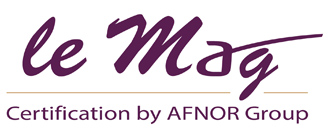Business has already understood that there is no avoiding the digital transformation. A quality policy based on ISO 9001 is the ideal tool to join this revolution and manage risks. An approach that puts quality engineers at the heart of the action.
The fourth industrial revolution is underway, as digital technology invades every department. “We are witnessing a technological upheaval comparable with the arrival of the steam engine or electricity. The entire company is being shaken up. New technology is not sparing a single box in the organization chart. Companies need to get organized. And just like in the preceding industrial revolutions, the underlying issue is the relationship between people and machines”, sums up AFNOR Group’s Quality and Performance Development Manager, Jean-Marc Reilhac. The company’s ability to innovate, or even reform its economic model and take onboard everything that makes up the digital transformation (connected, collaborative and dematerialized products and services that can be accessed from a smartphone) is being called into question. There can be no transformation without innovation!
How quality and digital technology are improving customer relations
Every company that has already been through the transformation agrees that a quality policy can help to avoid missing the digital technology boat. “The principles of internationally recognized standards, like ISO 9001, are based on the quest for and the improvement of customer satisfaction. Many digital tools based on dematerialization, collaborative methods and online opinions also pursue this same goal. And this is where linking quality initiatives to the digital transformation becomes really meaningful”, analyses Jean-Marc Reilhac. An observation confirmed by Air France’s Director of Development and QSE, Pierre Girault, in an interview with the magazine Alliancy. “The digitalization of customer relations quickly raises issues related to quality. It is necessary to measure customer satisfaction and to collect feedback, not to mention Big Data.” A claim already made in a study entitled “Quality and digital technology”, headed by the Organizations Performance Circle from the Paris-Dauphine Foundation, with AFNOR Group and the digital platform Parcours Croisés.
The SACD (the French “Société des Auteurs et Compositeurs Dramatiques”), which was recently certified by AFNOR Certification, took the strategic decision to make a success of its digital transformation by following the recommendations of ISO 9001, point by point. Founded by Beaumarchais in the 18th century, the French “Société des Auteurs et Compositeurs Dramatiques” defends the rights of dramatic authors and composers and supports them throughout their careers. “Our authors are faced with this digital revolution on a daily basis”, points out Foundation’s Quality Manager, Yuyao Carlot. “So it was quite logical for us to provide new services, such as online registration and declarations”. The SACD decided to go about this by following the ISO 9001 reference standard to the letter. A satisfaction survey (chapter 9.1.2), the creation of an IT and digital technology committee (6.1 and 6.2), a rework of the process (in accordance with chapters 4.4 and 8.1) and the implementation of performance indicators (9.1.3.), etc. And the results? “A very thorough process that covers the project in its entirety, saves time and boosts efficiency”.
Quality and digital technology: offering guidance to staff
A quality-based approach also guarantees that the users’ expectations are met more effectively. “Writing specifications that are then sent to the IT department does not meet today’s demands for a quick response. A reference standard like ISO 9001 allows IT structures to be set up that can then be modeled by the teams as they see fit, in a drive to combine quality, flexibility and short response times”, claims Olivier Le Pape, the Director of QualNet, which is specialized in the publication of professional software. Olivier Le Pape continues with the same example: “Several of our customers in insurance are exposed to very frequent changes in regulations. With a tailor-made system, the tool can be reconfigured to meet the new demands in just a few days, thanks to efficient management based on the processes described in the quality policy. A system that really saves time and money.”
But the host of changes introduced by digitalization can quickly make everything turn sour. One bad choice, one shaky arbitration and everything comes crashing down. The room that is being taken up by machines, robots and algorithms raises the question “So where do people fit into all this?” “Here again, ISO 9001 provides an answer”, emphasizes Jean-Marc Reilhac. “The digital transformation will fail if the awareness of the personnel is not raised, and if knowledge and skills are not properly managed. All these points are addressed in the chapter of the standard on Human Resources. Continual improvement – the basic notion underlying this whole initiative – is not possible without human intervention.”
Quality – one of the cornerstones of the digital transformation
AFNOR Compétences and the Kedge Business School teamed up to conduct a study of digitalization amongst the members of the Parcours Croisés clubs. Frédéric Ponsignon, Associate Professor in Operations Management, and Stéphane Kleinhans, Head of the school’s Master’s degree in Quality, look back at the main findings of the survey.

Frédéric Ponsignon (on the left) and Stéphane Kleinhans (on the right), the Heads of the Kedge Business School’s Master’s degree in Quality.
How has the digital transformation affected the quality function?
Digital technology is having a profound impact on the quality function. New tools and new uses are emerging. It is an opportunity that we must make the most of! For example, by developing participative methods internally, which are facilitated by collaborative tools in companies spread over several sites, by improving customer data management thanks to Big Data, or by dematerializing processes.
And how is the quality function influencing the digital transformation?
QSE managers are in the thick of the action. Since they are customer-oriented by definition, they have a cross-functional and global vision of the company, as well as tried and tested methods and tools. They are specialized in management systems, which is useful when it comes to putting a transformation to music. It’s up to them to set a good example by transforming their own business. Gandhi said “Be the change that you wish to see in the world.” A saying that sums up the philosophy of our study.
So it seems that the digital transformation and quality are closely linked to one another…
Yes, they are. Viewing the digital transformation through the prism of quality offers an additional lever to make a success of change on such a massive scale. It is also an exceptional opportunity to return the quality function to the heart of the company and to remind everybody of its utility in the organization in a highly visible manner.
Find out more on ISO 9001 certification for quality management systems





